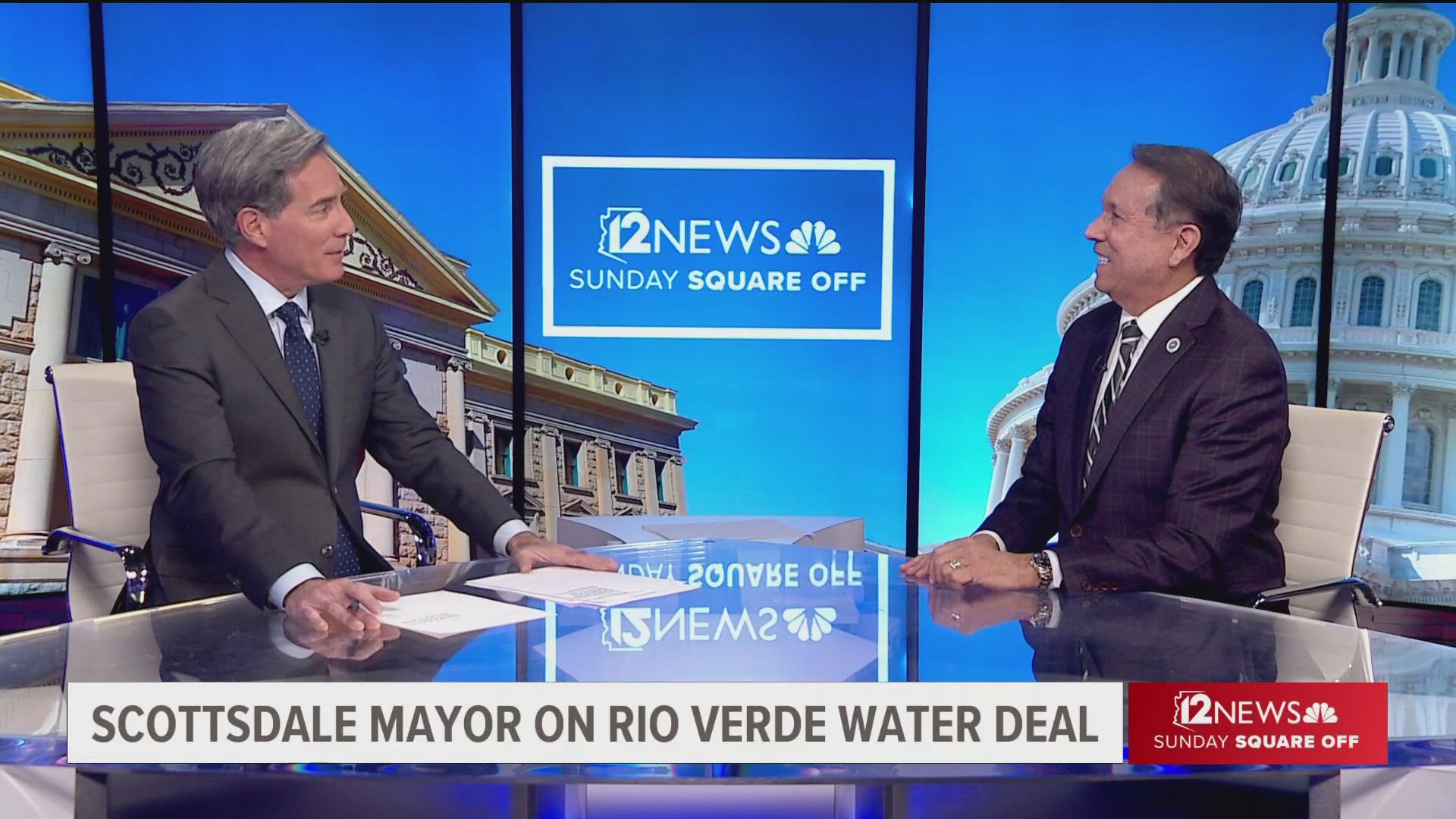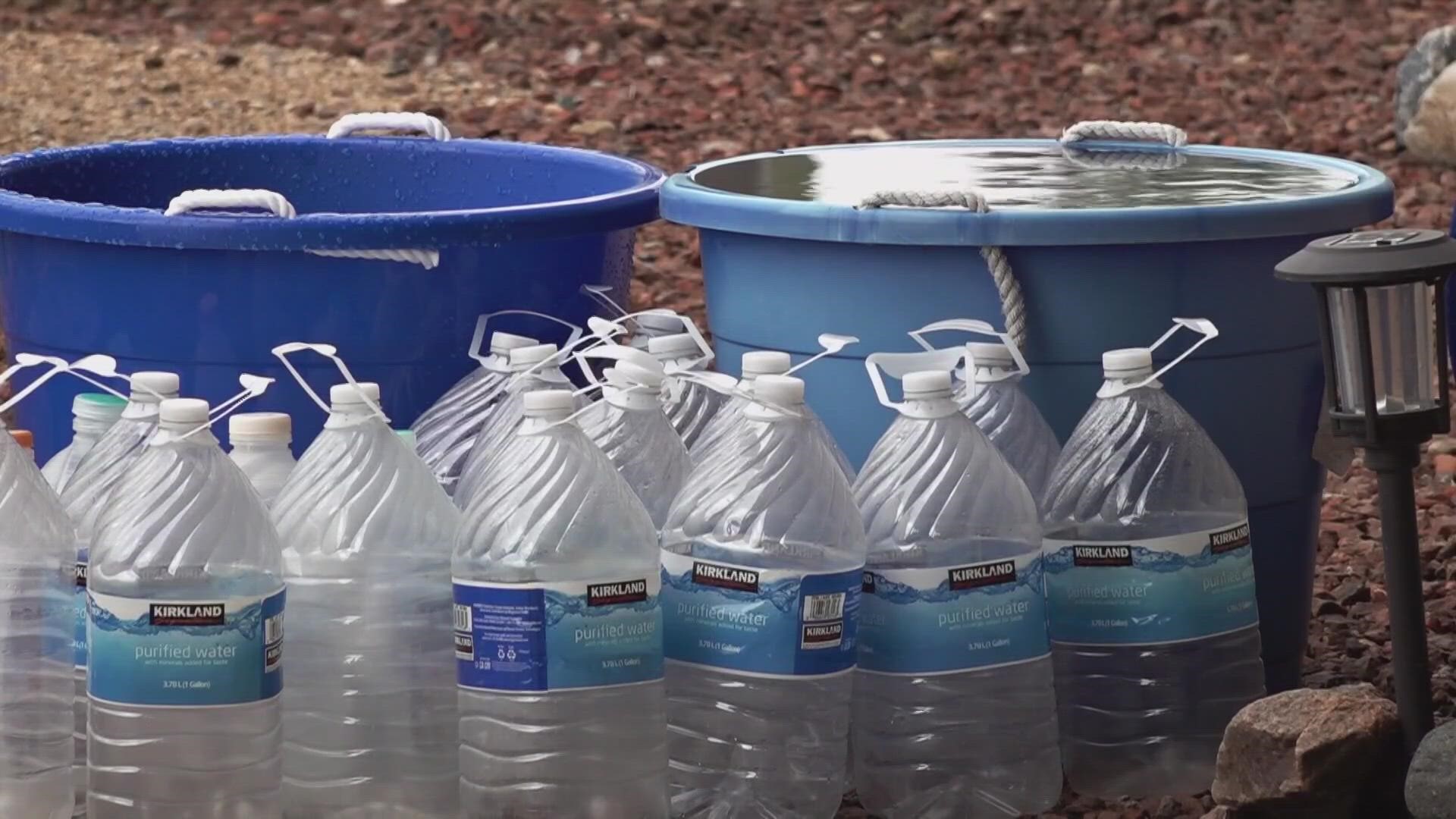PHOENIX — Rio Verde Foothills' loss of water service has become a national symbol of Arizona's failure to deal with the megadrought.
Now the unincorporated desert subdivision north of Scottsdale could become a symbol of something else: Rare cooperation among four levels of government to restore water service.
Almost eight weeks after Scottsdale cut off a decades-old water supply that served about 300 homes, the City Council is expected to vote at a 5 p.m. meeting Tuesday on a draft agreement with Maricopa County that would revive water service for at least two years.
A "yes" vote would trigger negotiations between the Scottsdale city manager and the county that could lead to the restoration of service.
Here's what we know about the proposed agreement and what comes next:
AG's opinion was breakthrough
The proposed deal came together quickly over the last few weeks.
The breakthrough was a legal opinion by Attorney General Kris Mayes' office that was drafted in a matter of days.
It allows Maricopa County to contract with Scottsdale or a water provider to "preserve public health and sanitation ... on an emergency basis."
"It needed to be fast and and we really kind of dropped everything to get this done," Mayes said.
The Democratic AG said the urgency was due to a concern that "folks were within, we think, a couple weeks of running out of water."
The opinion was sought by Republican State Rep. David Cook of Globe, who sought to mediate the crisis even though he represents a Pinal County community.
What proposed deal would do
Now a mayor who scorned the plight of Rio Verde residents just two months ago is on board with helping them, so long as Scottsdale's water isn't used.
"They are not a stepchild to Scottsdale," Ortega said in an interview on this weekend's "Sunday Square Off."
"Scottsdale always delivered the message that the problem originated at the county and the state level."
Ortega and the City Council could move the proposed agreement forward with a vote Tuesday night.
Ortega has spelled out a deal that would have the city buy water for Rio Verde Foothills, north of Scottsdale.
The city would resell the water to Maricopa County. The conduit for the water would remain Scottsdale's municipal water system.
The county would haul the water or pay contractors to haul it from Scottsdale's standpipe to about 300 homes in the desert foothills.
For decades, Scottsdale had provided water service to Rio Verde Foothills. The city cut off the supply on Jan. 1, after warning residents for months about the impending deadline.
The so-called "wildcat subdivision" has no water infrastructure for its homes.
Ortega says Scottsdale has to conserve its water supply for its own residents, in the face of likely cutbacks in Colorado River water. The Colorado provides about 60 percent of Scottsdale's water.
Where's water coming from?
If Scottsdale won't draw from its existing water supply to service Rio Verde Foothills, where would it find a new source of water?
During his "Sunday Square Off" interview and afterward, Mayor Ortega made conflicting statements.
On "Sunday Square Off," Ortega said the Gila River Indian Community, a Scottsdale water supplier, would provide more water.
Ortega and I had discussed the Gila River Indian Community's possible role three times during the "Square Off" conversation and again after the taping.
Tribes won't provide water
After the show taping Friday, 12News called a tribal representative for comment. The response: The tribe won't provide the water.
When questioned about the tribe's response, Ortega texted: "CRIT" (Colorado River Indian Tribes).
Sunday evening, 48 hours after the taping and after "Sunday Square Off" had aired, Ortega said he had "misspoke."
"You are correct I was thinking of CRIT and should NOT have mentioned GRIC," he texted.
But the leader of the Colorado River Tribes, like the Gila River Indian Community, says she can't provide water to Scottsdale.
"No one from Scottsdale has approached the tribes nor do they have the systems yet in place to deliver such water even if there was agreement on what the price would be," said Jason Rose, a spokesman for Colorado River Tribes Chairwoman Amelia Flores.
The city's responsibility for choosing the water provider could become a sticking point in negotiations over a Rio Verde agreement.
Ortega has refused to entertain the option of using EPCOR, a private water supplier that has proposed a longer-term solution to bring water to the foothills.
That solution is now before the Arizona Corporation Commission, the five-member elected body that regulates utilities.
A permanent solution is two to three years away.
How much would water cost?
Under the proposed agreement, customers' water prices could triple, based on what Scottsdale would charge the county for the water.
Would builders get green light?
The Rio Verde water crisis has put a spotlight on Arizona's lax laws governing water use.
Under Arizona law, the builders in the unincorporated Rio Verde Foothills don't have to show that homes have a guaranteed 100-year supply of water, as other developments do. The so-called "wildcat subdivision" has no water infrastructure for its 500 homes.
If water service were to resume, would that give home builders the green light to resume construction?
Ortega said only existing Rio Verde water accounts as of Dec. 31, 2022, would be serviced.
The proposed agreement would also require the county to establish a moratorium on new homes in the area. But that could violate state law.
What is the county saying?
Maricopa County Supervisor Thomas Galvin represents the area that includes Rio Verde Foothills, as well as Scottsdale. He has worked on finding a solution for more than a year.
In a Twitter thread last week, he said "I'm confident we can work together to find agreement on the short-term plan."
The longer-term plan, to have EPCOR provide water service to Rio Verde, requires the approval of the Arizona Corporation Commission. It could take two to three years to put in place.
Arizona Politics
Get the latest Arizona political news on our 12News YouTube playlist here.


